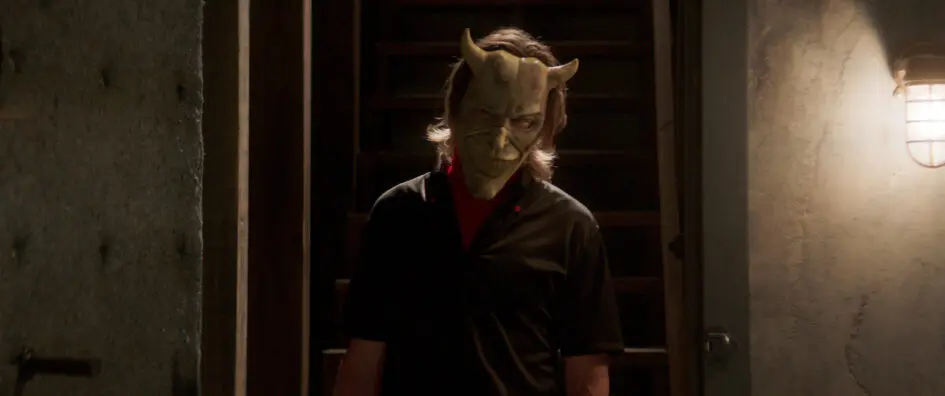Per Matt
After watching Doctor Strange in the Multiverse of Madness, I declared, “Free Scott Derrickson!”
Once the first franchise film was brought to the big screen, he was promised a true horror follow-up for its sequel, then plans changed by Marvel Studios. He was tied up in a comic book universe with a tight contract, but later bailed on the movie due to “creative differences.” While Jason was thrilled with the end result’s horror elements, I didn’t exactly agree. After watching The Black Phone, I can safely say that Derrickson made the right decision.
I guess I’ve got a thing for writers. Hold on, let me explain myself. I’m absolutely thrilled when someone focuses on their craft full-time and doesn’t get distracted by outside interests. Steven King is absolutely known for being the king of horror novels. By now, Jason Blum should be known for bringing success to lower-budgeted horror films. And The Black Phone feels like it’s kind of a combination of the two creative forces.
Scott Derrickson and C. Robert Cargill (AKA Massawyrm for all my Ain’t It Cool News friends…) expand upon Joe Hill’s short story (he’s King’s son, BTW). In a 1978 Colorado small town, “The Grabber” has already abducted five children before Finney (played by Mason Thames) becomes his next victim. But this teenager is different from all the rest. Instead of falling into his kidnapper’s head games, Finney plays it cool — with the assistance of an unplugged telephone.
Apparently, paranormal experiences have prominently blossomed in Finney’s family tree, but he’s never truly realized it until he absolutely needed the assistance. And he gets a lot of help from Gwen (Madeleine McGraw), his kid sister. Working together, they’re a formidable force.
It’s innocence lost with a supernatural twist. The teenage years are difficult enough, but when paired with The Grabber, it’s definitely a parent’s worst nightmare.
While this film focuses a lot of time on their brother-sister bond, none of this would even matter without a terrifying antagonist. Enter Ethan Hawke.
I’ve long thought Hawke built the basis for The Purge franchise (which was produced by Blum, BTW), so by bringing in the writer-director of Sinister, the producer has brought together the best of both projects. Which brings me back to being a fan of professional writers.
I was introduced to Hill via Fox’s NOS4A2, although the writer has popped into Eli Roth’s History of Horror from time to time. While I absolutely loved the creativity involved to manifest Charlie Manx, I didn’t know what to expect here. The Grabber doesn’t appear in too many scenes of this film, but when he’s onscreen, Hawke definitely draws you in with his performance.
The character seems ritualistic in his actions, but we never learn too much about him before the big finale. There’s no backstory, no reason for his being. This was a huge miss by Derrickson. Having Hawke as the biggest named star in the first place was a huge get for the filmmaker, but there is very little sympathy given for the character’s killings. This could be due to the original source material.
Clearly, I wanted to see more from the antagonist, but I REALLY wanted to know more about his masks, which provoke a powerful reaction. Filmmakers these days seem to spend fewer minutes developing bad guys than developing their storylines. I had the same reaction to Hill’s NOS4A2, but this release is a little different. With the right direction, Universal Pictures may have the makings of another hit franchise.
You could call The Grabber Hill’s version of Pennywise. While the character isn’t exactly wasted in The Black Phone, he could have proved to be more likeable, in a sense. While I don’t believe this is the last we’ve seen from Hawke in his role, I truly enjoyed the ride and I do want to see where these characters could go, moving forward.
Call on The Black Phone for some excitement this weekend. You won’t regret it!
